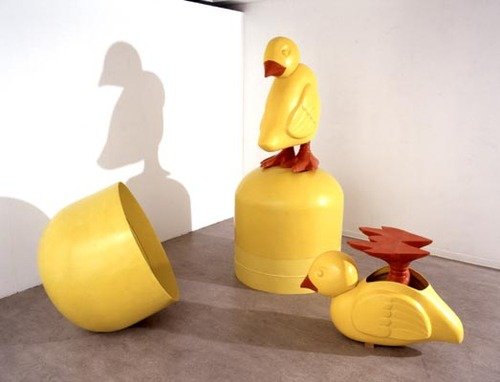22/2/2007
Viktoria Binschtok and Andreas Grahl
Amerika, Berlin
Binschtok finds her motives in public space. Grahl has his own point of view on causal connections in everyday life. His sculptures and installations confront the spectator with the illusion of familiarity.

One bear, one elephant, and three people on the phone
Viktoria Binschtok finds her motives in public space. Following her
intuition she seeks and finds symmetries of collective behavior patterns
of everyday life, whose existence otherwise seems to go unnoticed. Only by
the subjective sequencing of single observations to a series contexts
reveal that all of a sudden render meaning to ostensibly trivial
situations. The title - "three people on the phone" - of her current cycle
of b/w-silkscreen already discloses the quintessential content. We are
observing people who are busy - sometimes fussily, sometimes bored,
individually or in a crowd - with texting messages or being on the phone.
At first, it seems unspectacular, yet their composure, mimic and gesture
reflect the complete kaleidoscope of emotions. Obviously the mobile phone
appears to be as much a personal sheet anchor as a necessary connection to
the outside world. But the question of how and why these constellations of
three have formed remains unanswered between conspiracy theory and mere
coincidence.
Andreas Grahl has his own point of view on causal connections in everyday
life. His sculptures and installations confront the spectator with the
illusion of familiarity, just in order to trigger an even more lasting
effect of surprise. His toy figure-like bronze sculptures seem to be put
together according to completely different aesthetic principles than
indicated in the classical construction kit - and therewith work as
'classical' sculpture in the exhibition space. Similarly, a steel spiral
staircase put upside-down does not invite for climbing anymore. The
staircase is somehow easier to cope with by regarding it as borer cap that
has screwed through ceiling and floor and is now stuck. The obvious
mistake in the construction turns into calculated intervention and random
arrangements into essential components of the sculptural formation
process.
Image: Andreas Grahl, Cheeks, 2003, Poyesterharz, 190 x 200 x 300 cm
Opening on Friday, 23rd at 6 p.m.
Amerika
Brunnenstrasse 7 10119 Berlin



